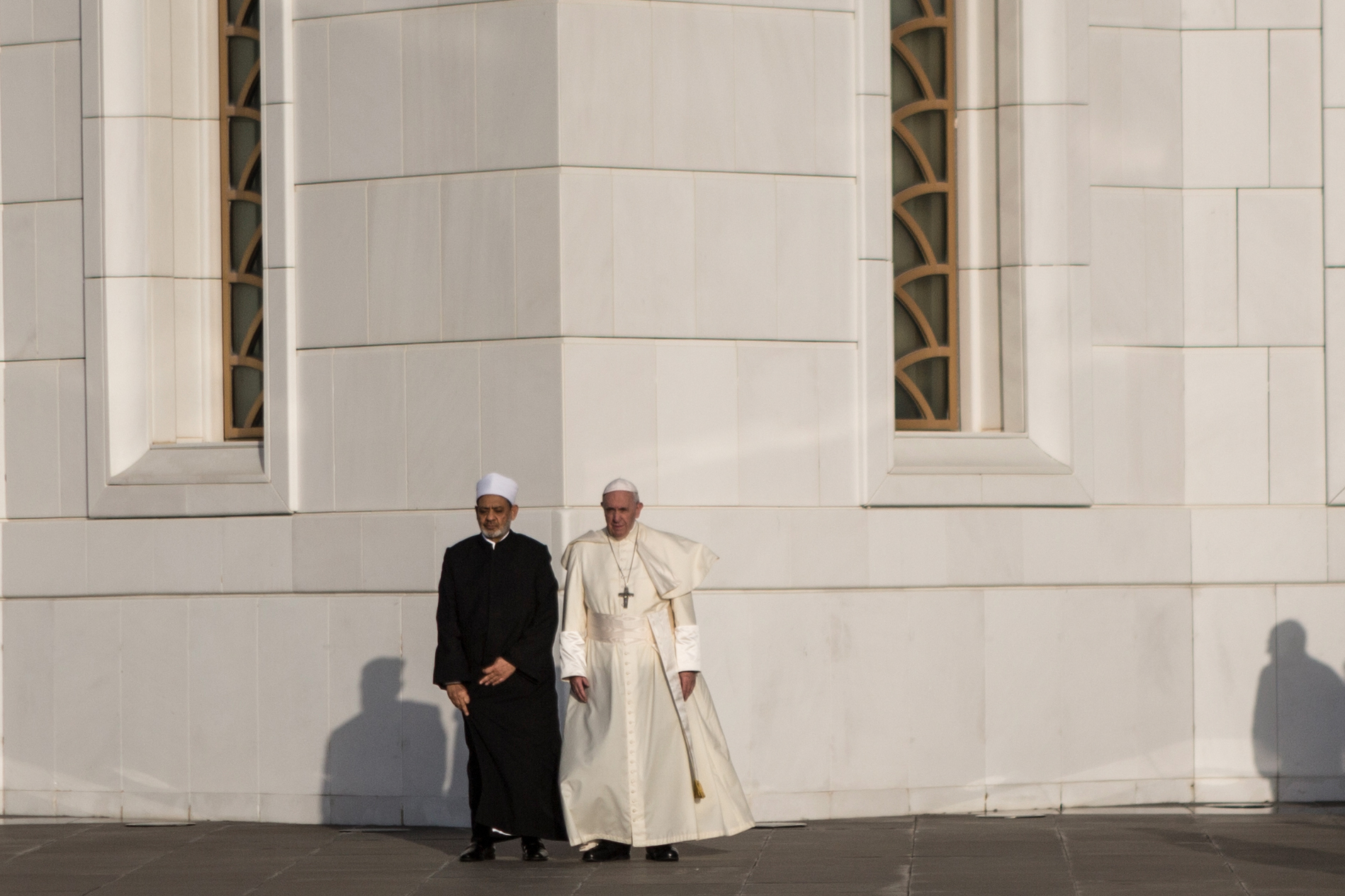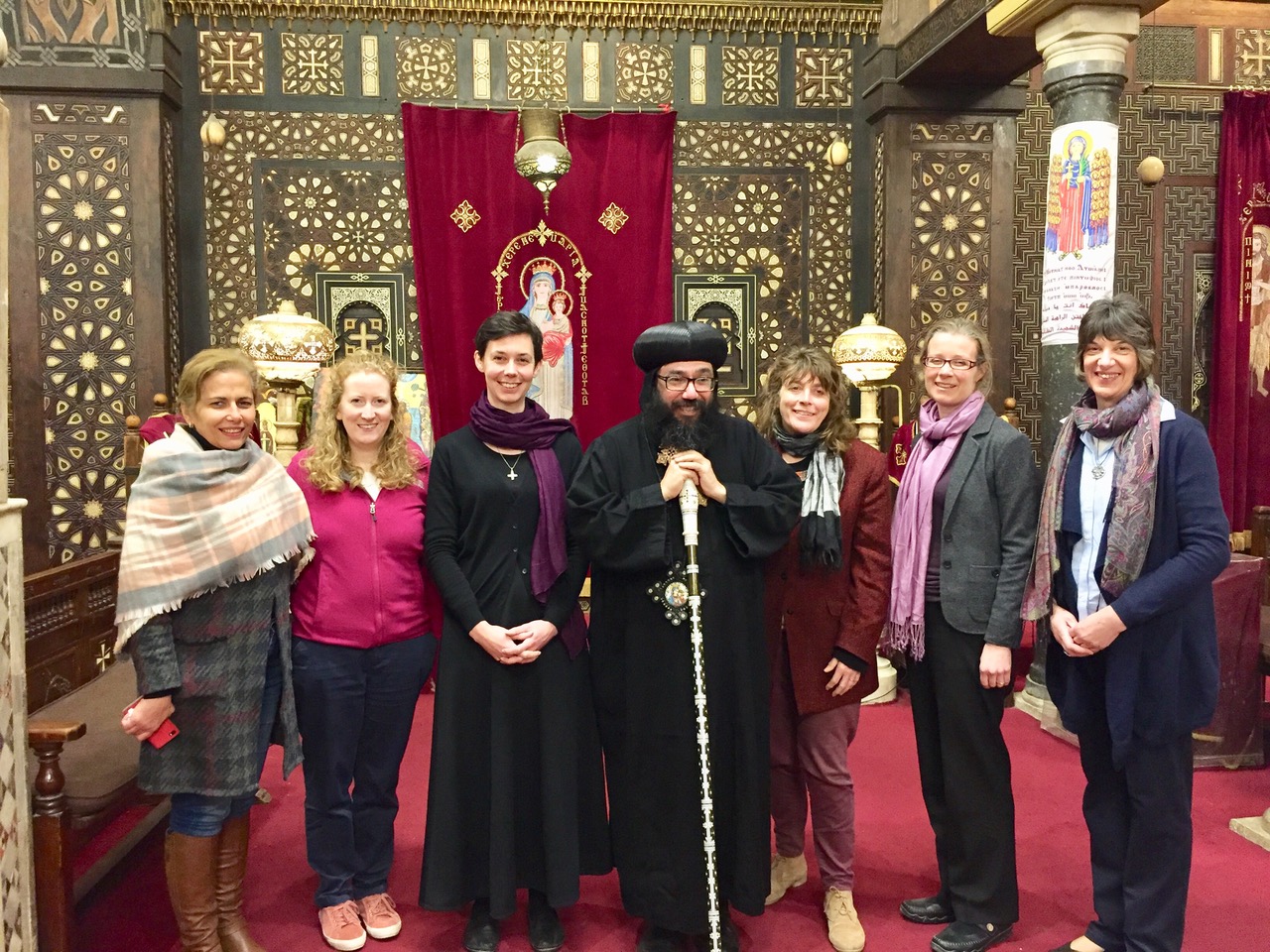The Bar Convent, York, has a serious relic collection. Outside the chapel, which contains the hand of St Margaret Clitherow, there are several wooden display cases containing dried out samples, loving labelled in Latin: ‘from the blood of…’, ‘from the bones of…’, ‘from the flesh of…’. Less gory, but more moving, is the sixteenth century book of saints where, in the endpapers, someone has written the names of those being martyred at the time: Henry Walpole SJ, Henry Garnet SJ. It’s an arresting reminder of what it must have been like to live through those times.
A few weeks ago, I was in Egypt with Embrace the Middle East, a charity which supports Christian communities across the region. As part of our tour, we visited the ‘Hanging’ Church of St Mary in Old Cairo, so called because it is suspended above the remains of a Roman fortress. I was struck by how history loops: the church was built on the first floor, with many exits so that the congregation could disperse rapidly, and an escape tunnel for priests, all of which are features of the Bar Convent’s chapel, built over 1000 years later in 1769. But where the Bar Convent is a heritage centre, the churches of Egypt have much more recent relics: bloodstains from a terrorist attack in Advent 2016 in St Peter and St Paul, Cairo, have been preserved behind plexiglass.
How does the Christian community respond to living among such recent relics, amid the constant danger of attacks? One response is the tight security we experienced during our visit. Churches and Christian institutions routinely have walls, fences, security scanners, road blocks and armed guards, which contrast jarringly with the cool peace of the churches inside the compounds, and their irrigated gardens. I never got over my unease that these spaces of peace were enabled by the threat of deadly violence, nor the uncomfortable sense that this was a tragic necessity.
But the Christian community also responds in another way to their precarious situation, through vulnerability and hospitality. Bishop Yolios, the Coptic Orthodox bishop of Old Cairo, is also responsible for the work of BLESS, the social outreach arm of the Coptic Orthodox Church. He spoke movingly of the way in which their education and healthcare programmes, particularly in Upper Egypt, overcome hate with love in a practical and effective way. If a clinic or hospital treats Muslims and Christians without distinction, he said, or if a kindergarten educates impoverished Christian and Muslim children side by side, ‘they will not soon turn to attack us.’ This response of love does not spring from a refusal to confront the reality of insecurity, or a naivety about the very real dangers Christians face in Egypt. It is an open-eyed self-gift in the face of potential hostility, and it is also an effective method of peacebuilding. There is something profoundly Eucharistic about it, something of what Timothy Radcliffe calls the ‘mad liberty’ of Jesus on the night of the Last Supper, taking his life in his hands and offering it for his friends.
How do we, with our much older collection of relics, respond to these new stories of persecution and martyrdom, and self-gift in the face of danger? The Catholic community in the UK is still very much shaped by the memory of persecution and, while it’s a source of pride, it can also make us touchy, self-protective and guarded. When the Church comes in for strong criticism from mainstream media –some of it well deserved– our first instinct is often self-defence. The experience of our sisters and brothers in Egypt, as in so many other places worldwide, gives us some critical perspective when we start getting carried away by our narrative of ‘being persecuted’. It also challenges us to ask what self-gift, a heartfelt and effective ‘doing good to those who hate us’, looks like in our own context.
Sister Theodora Hawksley is a young (33) sister of the Congregation of Jesus, currently working as a theologian in London. She joined the CJ sisters in 2015. Before that she did a PhD and postdoctoral work in theology up in Edinburgh, where her work focused on peace building, and particularly the contribution of religion and the arts to peace building. Currently, she is in the final stages of publishing a book on peace building and Catholic social teaching.



 Loading ...
Loading ...
What do you think?
You can post as a subscriber user ...
User comments (1)
It sounds as if the Polish bishops think that attitudes to sex and gender (and marriage) have been constant for two thousand years and more. Even when I was a child in the UK, most people around still thought of women as "included" in words like "man" or "men" - but few think like this now. Across the twentieth century and beyond, women have struggled for equal rights in society, and progress in this has been made. But the bishops need to engage with people and understand where they are now, and speak the message of the Gospel using language and concepts of the time we live in.